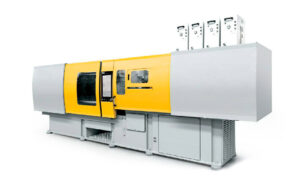
Starting from March 2025, the installation of a new injection molding machine is planned, which will expand our machinery fleet and the range of designed and molded products.
The installation, scheduled for March 2025, of a new Hydroblock 300-ton injection molding machine represents a further step for Mgv Rubber. This machine is equipped with an automatic extraction system and advanced control, ensuring high-quality parts with optimized energy consumption. Furthermore, the integration with the MGV management system according to Industry 4.0 standards ensures continuous and efficient monitoring.
Innovation in Rubber Molding: Example of an Advanced Injection Molding Machine
Our commitment to innovation drives us to continuously invest in cutting-edge technologies. The installation of our new Hydroblock 300-ton press, equipped with an injection capacity of 900 cm³ and automatic extraction technology, is a concrete example.
This press not only allows the use of modular molds up to dimensions of 625×625 mm but also includes a central hydraulic ejector that facilitates the mass production of complex parts. The integration of a servo-assisted motor and a proportional system for regulating pressures and flows ensures efficient energy consumption, in line with sustainability principles.
Another advantage is its ability to process silicone and other elastomers with precision, maintaining a perfect balance between cost and quality. Thanks to the integration with the MGV system, complete traceability and real-time optimization are ensured, strengthening our position in the advanced components sector.
Injection and Compression Molding: Technologies and Main Applications
Rubber molding is an essential process for the production of high-precision components used in a wide range of sectors, such as automotive, medical, and food. Among the most common methods are compression molding and injection molding, each with specific characteristics that make it ideal for different applications.
Compression molding involves placing the material in a heated mold cavity. Under pressure, the material distributes uniformly within the mold, ensuring parts of uniform quality and exceptional resistance. This method is particularly suitable for large components or those with simple geometries, such as industrial gaskets and technical parts.
On the other hand, injection molding offers greater precision and speed. This method allows the material to be injected directly into the mold with high accuracy, ensuring that each part meets rigorous specifications. It is ideal for complex and high-production components, such as machinery seals or advanced technical applications.
Materials in Molding: from Traditional Rubber to Silicone
The choice of material is crucial to ensure the performance and durability of rubber components. The most commonly used materials include:
- EPDM: Resistant to atmospheric and chemical agents, ideal for gaskets and seals in aggressive environments.
- NBR: Excellent oil resistance, widely used in industrial applications.
- Silicone: With unique properties such as thermal resistance and flexibility, this material is essential for food-grade seals and medical applications.
Our ability to work with different materials, including advanced elastomers, allows us to tackle projects of all kinds.
Advantages of Custom Rubber Molding with Mgv Rubber
Adopting a customized approach to rubber molding offers fundamental advantages:
- Design flexibility: Allows the creation of unique parts tailored to the specific needs of each customer.
- Cost optimization: The efficient use of materials and processes reduces waste and increases productivity.
- Compliance with standards: We guarantee compliance with specific regulations for sectors such as food and medical.
The focus on customized solutions not only improves product quality but also stimulates innovation in processes and technologies. The integration of machinery such as the Hydroblock 300-ton press reinforces our commitment to excellence and sustainability.
The MGV team works closely with the customer’s design teams to create customized components, offering technical support to adapt materials to specific needs and providing a high level of flexibility in the design and production of rubber seals, collaborating with customers to develop ad hoc solutions.